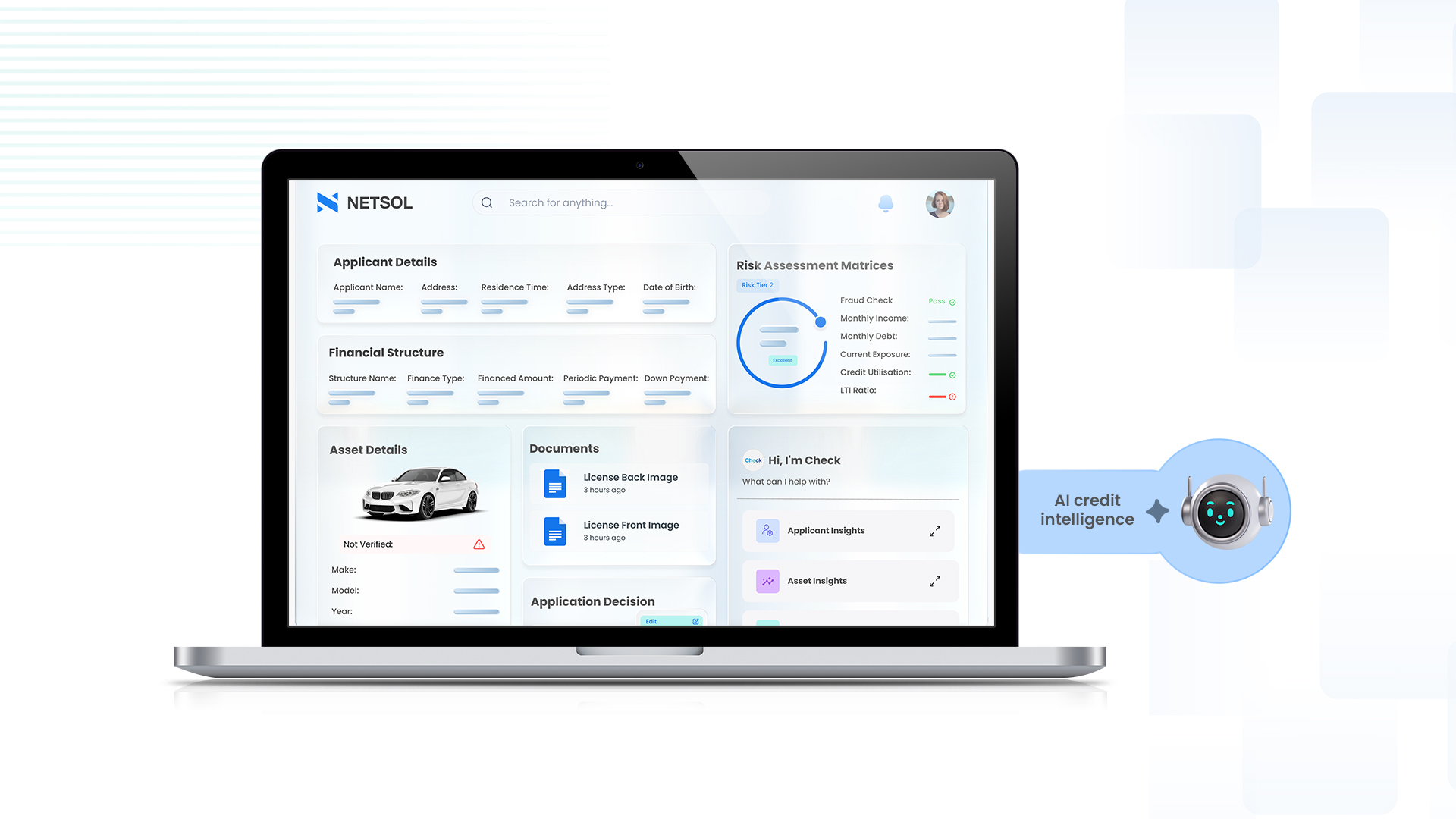Blog
Forward focus: Top trends for financial institutions for 2024
By NETSOL Technologies , on March 26, 2024
Several key trends are poised to continue to shape the trajectory of the financial industry in 2024, influencing strategies, operations and customer experiences.

From the integration of artificial intelligence and hyper-personalization to the rising importance of sustainability and digitization, financial institutions face both challenges and opportunities in navigating the ever-changing landscape.
As a global leader in providing cutting-edge technology solutions to the financial services industry across the world, NETSOL Technologies closely monitors emerging trends and continues to work on technologies that have gained much traction in the industry. In this article, we delve into the top trends identified by NETSOL that are expected to further drive transformation and innovation for financial institutions in 2024 and beyond.
Continued and further accelerated digital transformation
Digital transformation in commercial fleet finance is not a recent phenomenon in the financial services industry by any means, yet its widespread adoption significantly increased following the onset of the unprecedented global health crisis (the COVID-19 pandemic). It is speculated that digital transformation for financial institutions will further accelerate this year, and through continuous innovation, 2024 holds the potential to be a profoundly transformative period for the banking and financial services sector.
Although digital transformation is essential across various sectors, it has proven to be extremely beneficial for the finance industry. This is primarily due to the efficiency it brings to transactional processes, the majority of which can be automated. Additionally, it facilitates decision-making processes through the thorough utilization of data, which provides valuable insights into customer behavior and market fluctuations.
The future of the banking and financial services industry will be shaped by digital business models, ushering in a new era of competition among traditional service providers. To stay not just 'competitive' but essentially to stay 'relevant', banks and financial companies are facing mounting pressure to evolve into 'digital-first' organizations.
In 2024, we anticipate witnessing numerous banks and finance companies transform into technology-centric companies, capitalizing on their vast customer base and extensive distribution channels to offer digital solutions. Customer-centricity is also most imperative. How financial companies engage with their customers and how they can utilize technology to deliver superior customer experiences is at the core of their operations. Digital platforms provide consumers with increased accessibility and convenience. According to a Juniper Research report, the number of mobile banking users worldwide is anticipated to reach 3.6 billion this year, marking a significant increase from 2.4 billion in 2020.
Integrating cutting-edge technology and financial services is an absolute necessity to remain agile and competitive in today's ever-changing business landscape. 2024 will therefore continue to witness financial companies accelerate their adoption of cloud computing, big data analytics, artificial intelligence, robotic process automation and blockchain to automate and streamline financial operations. This is essential not just to enhance effectiveness, substantially reduce costs and provide clients with individualized services, but to meet ever-evolving business and market needs, and subsequently, to avoid being outdated.
In an effort to enhance their operations, meet evolving customer demands, deliver greater value to clients and stay adaptable and competitive in the dynamic business environment of today, financial companies must accelerate their digital transformation endeavors this year. Embarking on the digital transformation journey is no longer optional failure to do so carries significant risks of obsolescence and being surpassed by competitors.
Artificial intelligence
While artificial intelligence was mentioned above as part of digital transformation, AI is the biggest and most important development in the business world. It is therefore imperative to highlight its significance separately as it warrants its own section. According to Business Insider, nearly 80% of banks acknowledge the significant benefits that artificial intelligence can offer their industry. This is further validated by a study conducted by Juniper Research, which highlights that banks are projected to allocate a staggering $85 billion towards generative AI expenditure by 2030.
This significant figure underscores the industry's acknowledgment of the vast potential of generative AI in revolutionizing the banking sector. As per data from Stocklytics, global spending on AI-focused systems surged to approximately $154 billion last year (2023), with the banking industry taking the lead by investing a substantial $20.6 billion.
A study by Autonomous Research estimates that financial institutions could save up to a skyrocketing $1 trillion by 2030 through the adoption of AI and automation. Within the financial services sector, artificial intelligence is not just utilized for automation, but in a vast multitude of areas. It is harnessed to enhance risk management procedures via precise credit underwriting, fraud detection and prevention, thereby substantially minimizing losses. Banks and financial institutions are also deploying AI and ML to conduct efficient anti-money laundering (AML) procedures and facilitate know-your-customer (KYC) regulatory checks.
The capabilities of AI enable the analysis of vast datasets to recognize patterns, providing guidance to financial institutions in formulating more strategic decisions. This includes the identification of consumer behavior patterns derived from transaction history or spending habits. Generative AI consulting services and solutions bolsters customer retention via real-time, personalized financial recommendations and tailored product offerings to customers. AI and ML excel in simulating human interaction through chatbots and voice assistants, thereby fortifying customer relationships. In 2023, a study conducted by KPMG revealed that nearly 60% of finance managers at companies with sales exceeding $1 billion had already incorporated AI tools into their financial processes.
AI has revolutionized the industry, leading in overall efficiency improvements and decision-making, subsequently and inevitably resulting in revenue expansion and greater profitability. In 2024 and over the forthcoming decade, we anticipate there to be an even swifter uptake of AI technology in the industry.
Hyper-personalization and customer-centricity
As customer expectations continue to evolve, financial institutions are focusing on delivering personalized, omni-channel experiences tailored to individual needs and preferences. Leveraging data analytics and AI-powered insights, institutions can offer targeted products, services and recommendations to enhance customer satisfaction and loyalty. Hyper-personalization is required throughout the entire customer journey.
According to a McKinsey survey, nearly 80% of consumers are more likely to purchase from companies offering personalized experiences. The use of big data and analytics in crafting these experiences is not a mere trend; it's becoming the backbone of consumer payment strategies. McKinsey also speculates that organizations that get personalization right have the potential for 40% more revenue.
Previous research by Deloitte stated that customer-centric companies are 60% more profitable than those that don't focus on their customers. It is speculated that this figure has increased. Customer-centricity within financial services involves prioritizing the customer in every decision, interaction and advancement. It requires gaining insight into customers' needs, preferences and behaviors, and customizing products, services and experiences accordingly. This approach encompasses various aspects, including smooth digital onboarding processes, tailored recommendations, proactive customer assistance and user-friendly self-service features. Institutions that embrace a customer-centric approach aim to anticipate and surpass customer expectations at every touchpoint.
The utilization of data analytics has enabled financial services enterprises to cultivate stronger customer connections, introduce new products on a larger scale and enhance competitiveness in the market by tailoring offerings precisely to meet customer requirements.
ESG in the financial sector
Environmental, social and governance (ESG) criteria are increasingly becoming crucial factors in the finance sector. Banks and finance providers can make a positive impact by offering better loans as well as incentives to sustainable enterprises. As per Bloomberg New Energy Finance, sustainable finance issuance volumes globally amounted to $1.3 trillion in 2023.
According to a recent survey conducted among 300 banking executives worldwide, it was forecasted that 73% of banks will heighten their emphasis on sustainable banking alternatives over the next five years. This shift is driven by a blend of consumer demand and the increasing importance of ethical banking principles.
ESG considerations are increasingly influencing investment decisions, with investors demanding greater transparency and accountability from financial institutions. In response, financial institutions are expected to integrate ESG criteria into their investment strategies and offer sustainable finance products to meet growing demand.
In 2023, numerous governments and significant regulators pushed forward or implemented climate legislation and reporting requirements, underscoring the significance of 2024 as a pivotal year for financial services providers to tackle ESG and corporate sustainability initiatives.
The financial services industry is therefore poised for ongoing expansion in sustainable finance offerings in 2024. ESG-themed investment products, such as green bonds, sustainable investment funds and green loans are expected to broaden as investors increasingly seek alignment with ESG principles in their portfolios. Financial institutions are likely to persist in developing innovative ESG-focused products and services to cater to this demand, presenting opportunities for both financial gain and positive societal impact. McKinsey reports a worldwide requirement for an annual average spending of $9.2 trillion on physical assets to facilitate the transition to Net Zero by 2050.
By allocating funds towards sustainable projects, promoting socially responsible investments and incentivizing ethical corporate behavior, financial institutions play a significant role in shaping a sustainable and equitable future. It will be interesting to see how this continues to unfold this year.
Broadening of open banking
According to Forbes, open banking transactions are projected to surge from $57 billion in 2023 to a whopping $330 billion by 2027. Open banking initiatives are gaining momentum globally, enabling third-party providers to access customer data and offer innovative financial products and services. Financial institutions are likely to embrace open banking frameworks, fostering collaboration and competition to deliver value-added services to customers.
Open banking facilitates third-party access to a broader spectrum of financial services and products across non-banking financial entities and financial institutions via APIs. It serves as a catalyst for innovation within the financial sector, enabling banks and financial companies to efficiently engage a diverse clientele through partner applications while maintaining cost-effectiveness. By leveraging open banking, banks can gain deeper insights into consumers' financial profiles, thus enabling the creation of personalized products and services, consequently fostering increased customer loyalty.
Open banking also empowers consumers by providing them with greater control over their financial data. Customers can choose to share their data with third-party providers to access personalized financial advice, budgeting tools or other services that can help them manage their finances more effectively.
Further, with customer consent, financial institutions can access relevant financial information through APIs, substantially reducing or eliminating the need for manual paperwork and enabling rapid and more efficient decision-making processes.
NETSOL's unrivalled solutions for the ever-evolving global financial services industry
This year promises to be a landmark period for financial institutions, driven by significant changes and transformations. Avail this opportunity for a complimentary digital analysis by NETSOL Technologies, whereby you can discuss your financial institution's specific pain-points and attain tailored solutions to not just resolve them, but to essentially futureproof your operations. Connect with us today for your complimentary digital analysis.
Ascent is also available on the cloud, enabling smaller financial institutions to gain immediate access to the same next-generation platform used by bluechip and Fortune 500 companies worldwide without having to pay any upfront license fees! Ascent on the Cloud is available via flexible, subscription-based pricing, rapid deployments and the ability to scale on demand.
NETSOL introduced Appex Now - the first marketplace for API-first products specifically for the global credit, finance and leasing industry. The marketplace provides a suite of cloud-based, API-first solutions that cater to a broad spectrum of needs for financial institutions. The API-first strategy enhances development efficiency, reduces complexity, mitigates risk and facilitates integration with diverse systems and platforms. Experience unparalleled growth and success with our cutting-edge API-first products via lightning-fast onboarding and availability through subscription-based pricing.
Conclusion
Rapid advancements in technologies and capabilities are further expected in 2024 and in the years to come. Financial institutions that proactively undertake thoughtful transformations based on these financial services industry trends and technologies now will position themselves advantageously to surpass competitors and gain a clear competitive edge.
As we look ahead to the rest of the year, the transcend finance platform stands at the brink of unprecedented change and opportunity. By embracing digital transformation, fostering collaboration and prioritizing innovation, financial institutions can navigate the complexities of the modern landscape and position themselves for long-term success. From enhancing customer experiences to driving sustainability and harnessing the power of emerging technologies, the top trends for financial institutions in 2024 offer a roadmap for navigating the future of financial services and unlocking new possibilities in the ever-evolving world of the finance industry.
Related blogs

Blog
From credit checks to credit intelligence: How AI is redefining underwriting for captives

Blog
Shared financing models for high-value assets unlocking Indonesia’s next wave of growth

Blog



